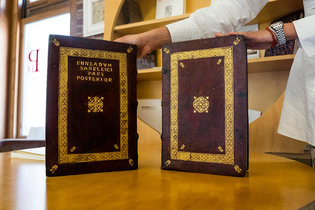“We are a big family,” Fabrizio Govi, a consultant for PRPH, said. “We have quick channels through which we can communicate to each other. This is the first big mistake. The second is you steal books from a gallery from the Upper East Side with cameras? And you give your name to the people who work there? This is to me, it looks very weird.”
Advertisement
Continue reading the main story
Mr. Hundiashvili, who confirmed he was the person the Police Department identified on Twitter, said there had to be some misunderstanding. “If I had ill intentions of doing anything to this company, would I provide them with my real name, my phone number, my email?” he said. “Obviously there is video footage of me all over that store, all over that building and whatnot. Why would I do that?”
Images of Mr. Hundiashvili were posted in September to the Twitter account of the 19th Precinct, which covers the Upper East Side, with a request to the public for tips on his whereabouts. The Police Department declined to explain why the bulletin was issued since the store says it is aware of Mr. Hundiashvili’s identity. Shortly after a reporter contacted the police, a bookshop employee said workers were told by the police not to share the video footage.
The two books stolen were a humanist text valued at $15,509 and palm reading text worth $4,900. Most books in the gallery are stored in cases, but these two pocket-size volumes were on display in a sculptural bookcase that is also for sale. Shortly after the theft, a man resembling the person seen in the video entered an antiquarian bookstore a few blocks away and tried to sell the two books, claiming that he had stumbled upon them. Suspicious of their provenance, the bookseller refused, according to Mr. Govi, who spoke with the other shopkeeper.
Rare-book dealers are well versed in warning signs that make them leery of certain sellers, said Pom Harrington, who owns a London-based rare-books firm named Peter Harrington. A pristinely preserved book with an oddly humble origin story is a dead giveaway. “When they say it comes from their grandma’s attic,” Mr. Harrington said, and “you can tell the book is reasonably sophisticated.”

“For a book to be found,” he continued, “it tends to have no indication it was handled by a professional.”
But the strongest indicator is a hit on the stolen book database operated by the International League of Antiquarian Booksellers. Mr. Harrington has used the database to identify stolen books that people were trying to sell to him. He has alerted the authorities more than once, which has led to arrests.
The Antiquarian Booksellers’ Association of America publishes a blog describing thefts nationwide and emails members the moment it is notified a book has been stolen, said Susan Benne, the group’s executive director. There are organizations like this around the world with task forces on stolen books, and there are global conferences on theft prevention, Ms. Benne said.
Still, sales of stolen books do take place and many booksellers have stories of inadvertently buying one, particularly those taken from private collectors who may not know about the databases. Some may not realize that they have been robbed: A particularly infamous case involved Marino Massimo De Caro, who was convicted of systematically pilfering the Girolamini Library in Naples, Italy, of which he was director, replacing many titles he took — including original texts by Galileo — with meticulous fakes.
(Filippo Rotundo, a co-owner of PRPH, has been cited in news reports as an associate of Mr. De Caro, an association Mr. Govi denies.)
Advertisement
Continue reading the main story
Despite their value, rare books are sometimes less guarded than might be expected. Glenn Horowitz, a rare-book dealer, installed an alarm at the front of the shop he used to operate in East Hampton, on Long Island, but it was just for show — none of his books were equipped with the devices needed to set it off. Still, in the store’s two decades, Mr. Horowitz said, nothing significant was stolen, a fact he attributes to the difficulty of selling black-market books.
There have been instances in which the rare-book community has been powerless to recover books: when they are taken by bibliophiles with no intention of reselling, said James Cummins, the proprietor of James Cummins Bookseller in Manhattan. Such thefts regularly befall library and institutional collections. When books disappear from the record, the loss is profound, he said. “You could lose diamonds, but a book has knowledge, it has history. You lose that entirely,” Mr. Cummins said. “Who cares about diamonds?”
Sitting inside the whitewashed gallery in the ornate Upper East Side brownstone a few months after the books disappeared, Francesca Biffi, a vice president of PRPH, was still troubled by their fate. “You don’t know what is their destiny,” she said. But she was comforted by the fact that the 500-year-old books had lasted this long. “I cannot say who is this man and why he stole the books,” she said. “I don’t know if he wants to keep them, if he wants to sell, I really don’t know. But I am sure they will survive.”
In late September, the mystery seemed solved. Mr. Govi emailed a reporter: The police had told him the books had been found. Then it deepened: The missing books had been mailed anonymously to the 19th Precinct station house on the Upper East Side, according to a Police Department official who did not want to be identified because the investigation was continuing.
No arrests have yet been made — of the man in the pink pants or anyone else.
Continue reading the main story
Article source: http://www.nytimes.com/2016/10/05/nyregion/we-are-a-big-family-dealers-unite-against-thefts-of-rare-books.html?partner=rss&emc=rss
Speak Your Mind
You must be logged in to post a comment.